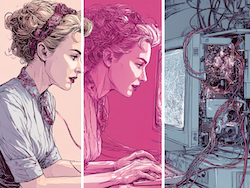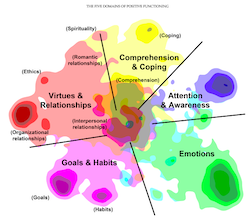Running a Household Like a Book Project
Part 2 of the Constellation for Chaos Series
One-sentence summary: Learn how this author transformed household management from overwhelming drudgery into creative project work using AI tools and ADHD-friendly systems that treat domestic tasks like writing chapters.
Here's something nobody tells you about owning a house in your forties: it's basically like having a needy pet that can't die but can definitely bankrupt you.
Last month, my Portland house decided to throw a tantrum that included a leaky roof, a furnace that sounded like it was gargling gravel, and a kitchen faucet that started doing interpretive dance every time I turned it on. Standing in my living room, surrounded by contractor estimates and a growing sense of domestic doom, I had an epiphany.
I'd written two books. I'd managed complex research projects with multiple moving parts, deadlines, and budgets. So why did household management feel like trying to solve a Rubik's cube while riding a unicycle?
The answer hit me like a Portland drizzle—sudden and persistent: I was treating my house like a burden instead of like creative work.
The Domestic Project Management Revolution
Writers know something that most household management advice ignores: big, overwhelming projects become manageable when you break them into chapters, scenes, and daily word counts. You don't write a book by staring at the blank page thinking "I need to write 80,000 words." You write it by focusing on today's 500 words, this week's chapter, this month's deadline.
What if I treated my house the same way?
Instead of "keep house clean forever" (impossible, soul-crushing), what about "complete kitchen renovation project by December" with clear phases, deadlines, and deliverables? Instead of "be domestic goddess" (exhausting, unrealistic), what about "research and implement new laundry system" like I was investigating a fascinating behavioral experiment?
The mindset shift was immediate. Suddenly, I wasn't failing at being a proper homeowner—I was managing a complex, multi-phase creative project that happened to involve plumbing.
AI as Project Manager for Domestic Life
Here's where things got interesting. I started treating Claude like my household project manager—not to do the work for me, but to help me think through the logistics like I would for any other major project.
"I need to renovate my kitchen," I typed. "Can you help me break this down into phases and identify what needs to happen in what order?"
What came back wasn't generic home improvement advice. It was actual project management: permits first, then demolition timeline, contractor coordination, temporary kitchen setup, material delivery schedules. Claude helped me see the renovation as a series of manageable chapters instead of one overwhelming novel.
The breakthrough came when I realized I could apply this approach to everything. Seasonal cleaning wasn't "spring cleaning"—it was "Q2 Household Maintenance Project" with specific deliverables and timelines.
The Chapter Method for Household Tasks
I started organizing household management into what I call "chapters"—focused projects with clear beginnings, middles, and ends. Instead of endless, recurring drudgery, each task became part of a larger narrative with actual completion points.
Chapter Examples:
- "Pantry Optimization Project" (research storage systems, purge expired items, implement new organization)
- "Garden Infrastructure Phase 1" (soil testing, irrigation planning, raised bed installation)
- "Energy Efficiency Audit" (utility analysis, weatherization, appliance upgrades)
Each chapter got its own Google Doc with research notes, decision points, and progress tracking—exactly like I'd manage a book chapter or article project.
The Research Phase Nobody Talks About
Here's something I learned from writing books that applies perfectly to household management: good research makes everything else easier. Before I write about any topic, I do deep dives into existing research, expert opinions, and case studies. Why not apply the same rigor to choosing a dishwasher?
AI tools became invaluable research assistants. Instead of drowning in conflicting online reviews, I could ask Claude to help me synthesize information: "Based on these appliance reviews and my specific needs (small kitchen, heavy cooking, noise sensitivity), what are the key decision factors for choosing a dishwasher?"
The AI helped me cut through marketing noise to focus on what actually mattered for my situation—just like a good research assistant would for any professional project.
Treating Yourself Like a Valuable Team Member
The biggest shift was learning to treat myself like someone whose time and energy matter. When I'm working on a book project, I don't expect myself to work eighteen-hour days without breaks. I plan for realistic timelines, build in buffer time, and acknowledge that some days I'll be more productive than others.
Why was I holding myself to different standards for household management?
I started scheduling household projects like writing deadlines—with realistic timelines, break days, and contingency planning. "Kitchen backsplash installation" got the same project respect as "Chapter 5 revision"—meaning I blocked out adequate time, gathered necessary resources in advance, and didn't expect to also accomplish seventeen other things that same week.
The Creative Satisfaction Discovery
Something unexpected happened when I started treating household tasks as creative projects: they became genuinely satisfying. Researching sustainable laundry systems felt like investigating an interesting behavioral question. Planning the garden layout engaged the same part of my brain that enjoys structuring article arguments.
I wasn't just maintaining a house—I was creating a living space that reflected my values and supported my work. The satisfaction was similar to finishing a challenging chapter or solving a complex research problem.
AI-Assisted Decision Making for Domestic Life
One of the most valuable applications has been using AI to help process household decisions that used to paralyze me. Home improvement involves countless micro-decisions that can spiral into analysis paralysis—paint colors, fixture styles, material choices.
Now I use AI to help structure these decisions: "I'm choosing between these three paint colors for my office. Can you help me think through how each choice supports my goals for this space?" or "I need to decide between upgrading my HVAC system or improving insulation first. What factors should I consider?"
The AI doesn't make decisions for me, but it helps me organize my thinking and consider angles I might miss when I'm overwhelmed by options.
From Maintenance to Creation
The most profound shift has been moving from maintenance mindset to creation mindset. Instead of seeing household tasks as endless chores that prevent me from doing "real work," I see them as parallel creative projects that support and enhance my primary work.
My house isn't a burden I have to manage while also being a writer—it's the workspace and sanctuary that makes my writing possible. Maintaining and improving it isn't separate from my creative work; it's part of the infrastructure that supports it.
Your Household Project Management System
Ready to try this approach? Start with one area that's been bothering you—the cluttered garage, the inefficient laundry setup, the kitchen that doesn't quite work for how you actually cook.
Treat it like a research project:
- Define the scope (what exactly are you trying to solve?)
- Research phase (what solutions exist? what do experts recommend?)
- Planning phase (timeline, budget, resources needed)
- Implementation (broken into manageable phases)
- Evaluation (what worked? what would you do differently?)
Use AI as your research assistant and thinking partner. Ask it to help you break down overwhelming projects, synthesize conflicting information, or think through decision factors you might miss.
Most importantly, give yourself the same respect you'd give any important project. Your domestic life deserves the same thoughtful attention you bring to your professional work.
What household project have you been avoiding that might actually be interesting if you approached it like creative work?
Stay Informed and Inspired
Join our community of forward-thinkers and gain insights into AI communication and storytelling. Subscribe to our newsletter for the latest updates and exclusive resources.





